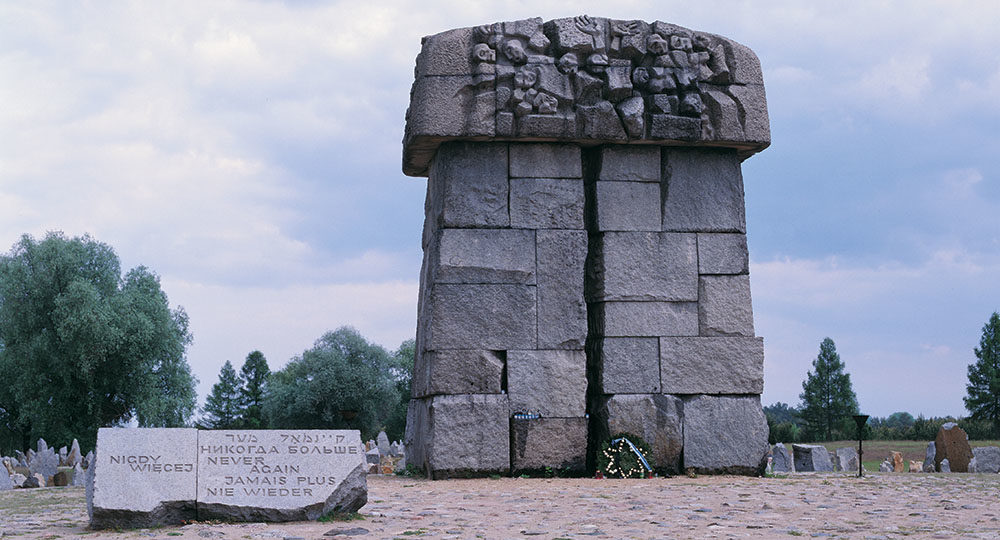The Holocaust: Keeping Faith
Teaching about the Holocaust in conjunction with faith is often a delicate situation. It is a sensitive, difficult topic, but one with many lessons for people who want to learn about the mercy and patience of God.
Why did God allow the Holocaust? How should people today react to the fact of the Holocaust? And what can I learn from such a tragedy? Many people ask these questions. The answers, of course, are found in the Bible.
The Holocaust is not something new to me. I grew up in a family where my father, a Holocaust survivor, spoke about it daily. For years, each Sabbath before going to church, we would eat breakfast and listen to a devotion that would be a story from the Holocaust. My father, Zvi, was ten years old in 1939 when the Nazis occupied his hometown of Warsaw, Poland. He became an orphan and managed to survive outside the ghetto because he didn’t look Jewish, and he learned how to run for his life.
Every day he told us something else that happened to him during those terrible years—how he ran from one place to another, what this person did to him, what happened to that person.
I have heard much about the Holocaust. And although I am relatively young, I probably know more about it than people who are eighty because I heard about it from someone who passed through it, someone who shared with us every description, every situation, and every gruesome detail.
Some aspects of the Holocaust are difficult for people to accept. But we must never dare to put ourselves in the position of thinking we are more merciful or knowledgeable than God. We do not know everything and cannot think that God somehow was indifferent; and, if only we had been in charge of the universe, we would have done better.
It is important to remember this fact when people imply that they are more merciful or trustworthy than God. God knows best. Let us always remember that.
The First Destruction
The Bible describes many tragedies, and they all have a common thread. How did God sanction the annihilation of nations? How did God punish individuals? What was His reason? What was His purpose? Why did He allow these things at all? And what kind of attitude did He expect His people to manifest after such tragedies?
A common factor runs through these past tragedies and those the Bible says are yet to come. We cannot separate the Holocaust from these but must place it within a biblical framework where it belongs.
One major tragedy, although not the first for the people of Israel, was the destruction of the first Temple by Nebuchadnezzar in 586 B.C. A great many people died then. And when the second Temple was destroyed by the Romans in A.D. 70, the number of Jewish people killed then was roughly equal in proportion to the number killed in the Holocaust. Of course, we were not eighteen million people in the second Temple era. But proportionately speaking, the percentage of Jewish people who died in that destruction was relatively the same as the percentage who perished at the hands of Hitler.
However, when we speak of the many people killed in the second destruction, not one of us even wrinkles a brow. Why? Because we did not have uncles or fathers or grandfathers there. It is easy to speak about a Holocaust that happened 2,000 years ago. But one that occurred only fifty years ago becomes a difficult, sensitive subject.
Why? Because our uncles and fathers who survived it are still alive. The blood is still fresh. Yet the same principles apply to all three tragedies and to the future destruction prophesied in the Bible. We should feel the same emotion for those who endured the second destruction as for those who endured the Holocaust of World War II.
The Captivity. Nebuchadnezzar was king of Babylon when the prophet Jeremiah warned the Israelites that God would allow the Babylonians to move against them and they would be taken from their land for seventy years. Why? Because they did not keep the Law.
Second Chronicles 36:21 tells us that Israel would be exiled for seventy years “until the land had enjoyed her sabbaths; for as long as she lay desolate she kept sabbath, to fulfill threescore and ten years.”
God sent the Israelites into captivity for one year for each sabbatical year they failed to observe. Sabbatical years were not intended for agricultural reasons alone. They were important for faith. In the seventh year, you were not to till the ground. By faith, you were supposed to gather your food from the ground without working the soil.
Thus the sabbatical year was to be a time of total dependence on God. You harvested what God gave. Those who had faith did not till the soil. They stayed at home, teaching their children to know about the Lord.
It is a beautiful picture of Deuteronomy 6:
And these words, which I command thee this day, shall be in thine heart; And thou shalt teach them diligently unto thy children, and shalt talk of them when thou sittest in thine house, and when thou walkest by the way, and when thou liest down, and when thou risest up (6:6–7).
“You don’t have time to teach your children?” God was asking. “I’ll give you a full year to do so. Don’t come and tell me, ‘I didn’t have time.’ I will work in your field. Just teach your children to know Me.”
But for almost 500 years, the people of Israel did not keep the sabbatical year. Consequently, for each one they failed to keep, they suffered one year outside the land. For hundreds of years they demonstrated a lack of faith—but God was patient. He did not bring chastisement immediately.
So He allowed them to be taken into captivity in Babylon for seventy years. Do not think it was an easy trip. Nebuchadnezzar did not come with buses or jumbo jets, telling people, “Here is your food package. Enjoy it while flying to Babylon.”
They walked more than 1,000 miles and hungered for death along the way. A certain young man walked into exile from Jerusalem to Babylon in 605 B.C., during the first wave of deportation. He probably saw his parents die along the way. No doubt, many of his friends never arrived at their final destination. He was fifteen to twenty years old. How do you think he reacted when he saw a nation dying before his eyes?
In Daniel 9, he described everything. Many people think that chapter 9 contains only prophecy. However, only verses 24–27 are prophetic. Most of the chapter is Daniel’s prayer.
And I prayed unto the LORD, my God, and made my confession, and said, O Lord, the great and awesome God, keeping the covenant and mercy to them that love him, and to them that keep his commandments, We have sinned, and have committed iniquity, and have done wickedly, and have rebelled, even by departing from thy precepts and from thine ordinances (vv. 4–5).
Not once does the Bible mention any personal sin on Daniel’s part. Yet he basically prayed, “Forgive me as well. I and my nation, my leaders, we all broke the law. The shame is on us, not on You.”
Bear in mind that the man who said this saw his nation die along the way. He saw his country collapse and his people taken captive. Yet Daniel did not say to God, “It’s unfair.” Instead, he said, “The shame is on us. We broke Your law. You are so merciful. Please forgive us.”
He said, “O Lord, righteousness belongeth unto thee, but unto us confusion of face, . . . to our kings, to our princes, and to our fathers, because we have sinned against thee” (9:7–8). In verse 9 he said, “To the Lord, our God, belong mercies and forgivenesses, though we have rebelled against him.”
The Purpose. We do not have a God who one morning says, “Oh, I hate them,” and the next morning changes His mind and says, “Oh, today I love them.” God is not fickle. He does not have moods. He is different than we are. His thoughts are different; His ways are different. God’s actions are not arbitrary or impulsive, precipitated by whims. God’s actions are based on His righteousness and holiness and are for the ultimate betterment of the people.
Because He is righteous and holy, He says, “If you will not listen to Me, I must correct you.”
Some of us are parents. Imagine if we repeatedly told our children, “Woe to you if you do not do what I say, because I will punish you,” but we never kept our promise. Imagine if we never corrected our children for the wrong they do and let them do whatever they pleased. We all know what we would be creating. Monsters. We would have a society of anarchists.
The principle is the same with God. His righteousness and holiness demand that He correct His people. Such correction is designed to restore them to a right relationship with Him. In the case of the first destruction, God waited almost 500 years. Such is the balance between love, mercy, longsuffering, and righteousness.
Although Daniel had seen the extreme hardship of his nation, he nevertheless confessed his sin and uttered not a word of criticism against God. This is the example God sets before us.
The nation of Israel sinned. So, too, we sin in our daily lives. God is not guilty. We are guilty. And in the end, God expects the nation to say, as He expects us to say, “We are sorry, God. Please forgive us.”
God wants us to repent. Our repentance is His objective. It is what He seeks from the nation of Israel through what appear to be, humanly speaking, national tragedies. His aim is repentance, not rebellion.
Thus we conclude that the purpose of God’s chastisement is to educate and to bring His people to repentance and back into the will of God. His objective for His children, therefore, is always remedial, never retributory.







